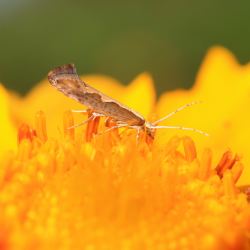
The race is on as to where the first genetically modified (GM) organisms will be released into the environment in the United States.
Florida came close last year with a plan to release GM mosquitoes from the company Oxitec to combat viral infections such as dengue, Zika, and chikungunya. However, the plan was foiled when a "no" vote from one area's constituents, Key Haven, put the plan on hold for a few more years.
The release of GM organisms is not limited to mosquitoes or warm climates, however. In fact, New York is well on its way to release GM diamondback moths (Plutella xylostella) in an effort to keep its crops safe from destruction. If it happens, this will be the first release of GM organisms in the United States.
The permit application for a field trial was submitted by a team at Cornell University. This week, a statement released by the United States Department of Agriculture (USDA) Animal and Plant Health Inspection Service (APHIS) included the final environmental assessment. In it, they state that the level of risk to the environment or human health as stated in their finding of no significant impact is such (very little to none) that a field trial will, indeed, be granted.
The diamondback moth costs farmers billions of dollars as one of the leading pests of agriculture. It is actually not the adult moths, but, the larval stage of the caterpillar that eats the plants. This non-native pest eats mostly cabbage, cauliflower, and broccoli and has become resistant to insecticides (both organic and non-organic.) The release of Oxitec's GM diamondback moths would reduce the population of diamondback moths.
The permit allows for the release of up to 30,000 moths per week over several months. The idea is to release adult male moths that have been genetically engineered so that, after mating with females, the female offspring (caterpillars) that are produced fail to survive. Over time, this results in substantially less female moths. Because the male moths only mate with females from their own species, there is no risk to other species. Also, there is no long-term persistence of the genes in the environment as the diamondback moth has a lifespan 12 and 16 days, once the GM insects die out, their genes do not persist in the environment.
We should remember that this is a field trial - a test so to speak. It is stated that "The purpose of the field release is to assess the feasibility and efficacy of these moths in reducing populations of diamondback moth, a known plant pest and serious threat to agriculture."
But, prior data suggest that this will be effective and we know that it is feasible. Now, all that we have to do is to convince the public that genetically engineered organisms are a safe, efficient, pesticide-free way to help farmers keep more of their crops and money. No small task, indeed.
References:
Proposal to permit the field release of genetically engineered diamondback moth in New York
